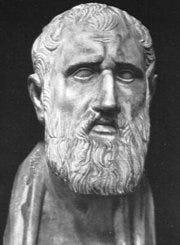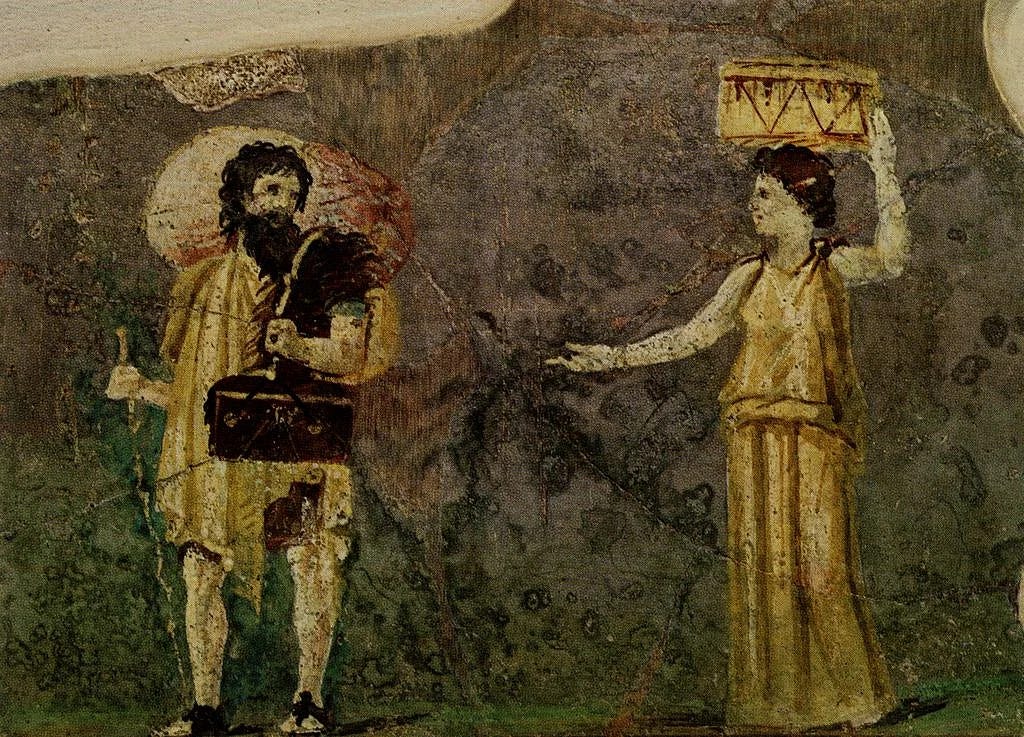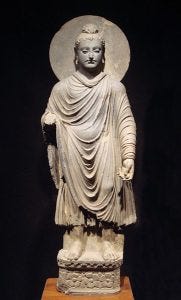
Dear Classical Wisdom Reader,
Stoicism is all the rage these days…
But how did it begin?
Long before Marcus Aurelius (or any of the podcasts or self-help books) there was Zeno of Citium.
Today’s article looks at what influenced this shy and humble merchant, how he developed his philosophy, as well as his immense legacy.
It also touches on similarities between Stoicism and Buddhism, something we’ll be looking at in much more depth at our upcoming webinar Stoicism and Buddhism: Two Sides of the Same Coin?
Anya will be joined by Dr. Benjamin B. Olshin to discuss the key similarities and differences between these ancient approaches to life, and what they can tell us about living in our world today.
That’s on July 10th at Noon EST. You can register to attend HERE!
If you can’t join us live, don’t worry! If you register in advance, you can still receive the recording.
For now, read on to discover how a shipwreck on a stormy night changed the world of philosophy forever…
All the best,
Sean Kelly
Managing Editor
Classical Wisdom
The Pursuit of Happiness This week’s edition of our Members-only series Podcasts with Professors looks at the Classical influence on the founding fathers of the USA.
The First Stoic
by Van Bryan
Despite being a quiet man who had no desire for dramatic lectures or elaborate festivities, Zeno of Citium became known as the father of Stoicism. He laid the foundations for later Stoics, including Seneca and the Roman emperor Marcus Aurelius.
Born around 334 BCE, he was a humble merchant and often traveled due to his profession. When he was young, it’s said that he went to visit the Oracle at Delphi, and asked how he should best live his life. The Oracle, characteristically cryptic, replied that he should “take on the colour of dead men.”
According to the biographer Diogenes Laërtius in his Lives of the Eminent Philosophers, one night the ship Zeno was traveling on got caught in a storm. He was shipwrecked up on the shore, and his valuable cargo of purple dye had been completely lost or destroyed.
He had landed in Athens. As he wandered through the city, he visited a bookshop and heard the bookseller reading from Xenophon’s Memories of Socrates. Socrates himself was, of course, long dead at this point. Perhaps Zeno thought of the Oracle’s mysterious words, but in any case, he was so impressed by Socrates’ teachings that he asked if there was anyone like that he could meet.
Just then, the famed Cynic philosopher Crates of Thebes happened to be passing. He was believed to have been a disciple of the famously barrel-dwelling Diogenes of Sinope, and his wife Hipparchia was also a Cynic philosopher. The bookseller pointed Crates out to Zeno, who went to meet him. Crates then became his teacher and friend.
Zeno left his life as a merchant behind and dedicated himself completely to philosophy. He was inspired by the Cynics, but he also had new ideas of his own, so he started his own school of philosophers. They used to meet at a place called the Painted Porch, or Stoa Poikile in ancient Greek. Their type of philosophy became known as Stoicism because of this.
While Zeno admired the Cynics, he was too modest to ever fully indulge in their lifestyle of anti-establishment behavior. Diogenes of Sinope thought it okay to urinate and defecate in public, sticking it to the man thousands of years before the hippie revolution. Zeno, however, was easily embarrassed, and reportedly once ran away in shame after his teacher purposefully poured soup on him.
While Zeno may never have been the Cynic that Diogenes was, he certainly shared his no-nonsense approach to life. Zeno held little interest in abstract metaphysical thought. And while he studied numerous topics as a philosopher, he would be most well remembered for his work on ethics.
Ethics very simply is the study of what makes something good or bad. We all pretend to understand the concepts of “good” and “bad”, but ethical philosophers look to explain why something was good or bad. Essentially, ethical philosophers set out to try and explain what is the best way to live our lives. Stoicism, therefore, is not fun food for thought. It is a way of life.
Stoicism teaches that the universe is predetermined, sculpted by a supreme lawgiver. We, as humans, can do nothing to change this fact. The only thing we are capable of doing is controlling our own goals and our own thoughts. And this is where the key of Stoicism can be found, controlling our own thoughts.
Stoics believe that it is unwise to pursue a life filled with superficial pleasures and lavish desires. We poison ourselves by continuously desiring more and more pleasurable things. And we attempt to find these things at the expense of our own peace. The Stoics teach that it is in our power to change this way of thinking. By removing these desires for superficial treasures we can become one with the world around us, a world that is crafted by reason and flows serenely through all of time.
Imagine that you are stuck in a traffic jam. You are late for work, yet the cars ahead just won’t move. You could get angry and start thrashing your fists about. However, the Stoics would teach you to readjust your thinking. There is nothing you can do about a traffic jam, it is beyond your power. All you can control is how you react to this problem. You can choose to be at peace with your situation. Your inner turmoil is of your own design. The modern British Philosopher, Bertrand Russell, quotes Epictetus, a later Stoic philosopher in his book The History of Western Philosophy when he says:
“sick and yet happy, in peril and yet happy, dying and yet happy, in exile and happy, in disgrace and happy,”
The Stoics taught that we were capable of free will, however this free will did not allow us the capacity to change our world. We simply must make the best of our situation and find our contentment within this life, no matter the circumstances. Fulfilling our desires is not what can bring us contentment in life. It is learning to rid ourselves of these desires that can truly bring us to peace.
Zeno’s philosophy of Stoicism would find favor with much of Hellenistic Greece as well as with later thinkers of the Roman empire. One very notable follower of Stoicism is the Roman emperor Marcus Aurelius, who would write extensively about the philosophy in his The Meditations. It is rather remarkable that Marcus Aurelius would find contentment by following the modest lessons of Stoicism. After all, he was a man who could have had any of his earthly desires fulfilled, and yet he resigned himself to a life of virtue and ethical stability.
Stoicism is often compared to the eastern philosophy of Buddhism. Certainly the notion of doing away with our superficial desires and learning to live in harmony with nature are central tenets of stoicism and Buddhism. It is not unreasonable to make this comparison that stoicism and Buddhism have developed similar ideas. It would give currency to the idea that ethics is a universal concept, that all people look to achieve contentment in life.
Zeno of Citium was known as a quiet man who preferred living modestly. It is unsurprising that he would develop a philosophy that so mirrored his personality. To Zeno, life was not about seizing the most riches and dying in a tomb made of gold. All that matters is that we accept this world as it is and change our own perception to find peace.
As Zeno himself famously said, “I made a prosperous voyage, when I suffered a shipwreck.”
Más info en https://ift.tt/tWd0ITD / Tfno. & WA 607725547 Centro MENADEL (Frasco Martín) Psicología Clínica y Tradicional en Mijas. #Menadel #Psicología #Clínica #Tradicional #MijasPueblo
*No suscribimos necesariamente las opiniones o artículos aquí compartidos. No todo es lo que parece.




No hay comentarios:
Publicar un comentario